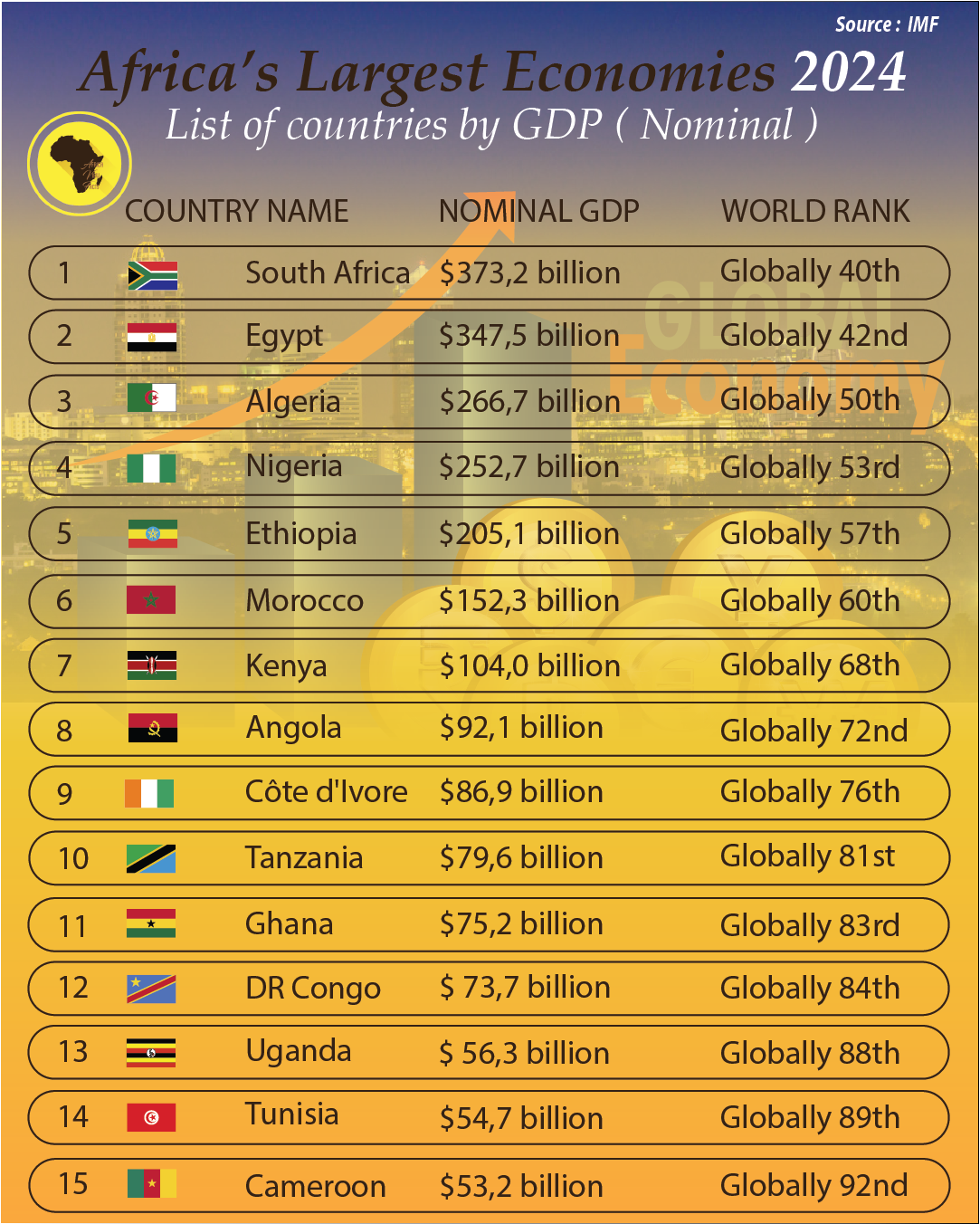Business & Money
Angola to Surpass Kenya’s Economy in IMF 2024 Forecast
Angola’s economic surge is fueled by a mix of factors, primarily the recovery of its oil sector and significant strides toward diversifying its economy. After a period of decline, the country’s oil production saw a sharp rebound in 2023, with rising global oil prices boosting revenues. However, the Angolan government has also prioritized reducing its reliance on oil by making substantial investments in agriculture, mining, and manufacturing, aiming to build a more balanced and resilient economy.

The IMF forecasts Angola’s economy to surpass Kenya’s in 2024, signaling a shift in Africa’s economic landscape. Discover the factors driving Angola’s rapid growth.
By Charles Wachira
In a surprising shift in Africa’s economic landscape, Angola is expected to overtake Kenya as the third-largest economy in Sub-Saharan Africa, according to the latest forecast from the International Monetary Fund (IMF), released on october 23.The IMF projects Angola’s economy to reach $122 billion in 2024, edging past Kenya, which is forecasted to maintain a GDP of around $119 billion. This marks a significant turnaround for Angola, a country whose economy has long been dependent on oil exports but has recently diversified into other sectors.
Angola’s Economic Surge: Oil and Beyond
Angola’s rise is being driven by a combination of factors, most notably the recovery of its oil sector and major efforts to diversify its economy. The country’s oil production rebounded sharply in 2023 after a period of decline, with higher global oil prices boosting revenues. However, the Angolan government has also focused on reducing its dependency on oil, investing heavily in agriculture, mining, and manufacturing to create a more balanced and resilient economy.
“The oil industry has always been central to Angola’s economy, but we realized the need for diversification,” said Angola’s Minister of Finance, Vera Daves. “In the past five years, we’ve made deliberate efforts to invest in infrastructure, education, and agriculture. We believe this has laid a strong foundation for sustainable growth.”
Kenya’s Slower Growth Amidst Economic Reforms
Meanwhile, Kenya’s economic growth has slowed in recent years due to a mix of domestic and external challenges. Rising public debt, coupled with high inflation and a weakening Kenyan shilling, have tempered the country’s ability to maintain its previously robust growth. Additionally, the country has faced disruptions in key sectors such as agriculture, which has been affected by erratic weather patterns and global supply chain issues.
Kenya’s Treasury Secretary, John Mbadi, acknowledged the challenges in a recent address to parliament: “While Kenya remains a strong economic hub in East Africa, we are dealing with a series of structural reforms aimed at addressing our debt levels and creating a more conducive environment for private investment. These reforms take time, but they are necessary for long-term stability.”
Despite this, Kenya’s service sector, particularly in telecommunications and financial services, continues to thrive. Safaricom, the country’s largest telecom company, has expanded its operations into Ethiopia, and the banking sector remains resilient. However, these gains have not been enough to offset challenges in other sectors like manufacturing and agriculture.
A Shift in Regional Economic Power
Angola’s projected overtaking of Kenya underscores a broader shift in Africa’s economic dynamics. Traditionally, Kenya has been seen as a leading economic power in East Africa, boasting a diverse economy with a strong service sector, robust financial institutions, and a burgeoning technology scene. However, Angola’s rapid recovery and diversification efforts reflect how resource-rich countries can quickly catch up when they invest in non-oil sectors.
Economic analysts note that this development is a sign of the growing competitiveness across the African continent. “Angola’s rise shows how African economies are becoming more dynamic and adaptable,” said David Ndung’u, an economist at the University of Nairobi. “Countries that were once heavily dependent on one sector are realizing the benefits of diversification and are seeing faster economic growth as a result.”
What This Means for Africa’s Economic Landscape
The shift could alter the balance of regional influence, especially in East and Southern Africa. While Kenya remains a key player in the East African Community (EAC), Angola’s growing economic clout will likely enhance its role within the Southern African Development Community (SADC). Furthermore, with both countries being part of the African Continental Free Trade Area (AfCFTA), this change could impact trade relations across the continent.
Kenya’s position as a gateway for international investors into East Africa may be slightly diminished, though analysts suggest that Nairobi will still maintain its status as a business hub. However, as Angola continues to grow, it may attract more foreign investment, particularly in sectors like mining, infrastructure, and energy.
Looking Forward: The Road Ahead
Despite the challenges, both Angola and Kenya are poised for future growth, albeit on different trajectories. Angola’s emphasis on diversification and Kenya’s focus on reforms will shape their economic paths in the coming years.
Vera Daves remains optimistic about Angola’s future: “This is just the beginning. We believe that with continued investment in non-oil sectors, Angola can sustain this growth and become a major player on the global stage.”
John Mbadi, on the other hand, is focused on ensuring Kenya remains competitive. “We are taking the necessary steps to stabilize our economy and restore investor confidence. Kenya’s potential is undeniable, and we are confident that our economy will rebound stronger.”
As Angola prepares to take the lead over Kenya in the IMF’s forecast, the race for economic dominance in Sub-Saharan Africa is far from over. Both countries will continue to play significant roles in shaping the continent’s economic future, but for now, Angola has the upper hand in this high-stakes competition.
Conclusion
The IMF’s latest projections for 2024 mark a notable moment for both Angola and Kenya. While Angola is poised for a remarkable recovery, Kenya remains focused on overcoming its economic hurdles. This new ranking is a reminder that Africa’s economic landscape is evolving, with resource-rich countries like Angola embracing diversification and rising to the forefront. Whether Kenya can regain its position as a regional powerhouse will depend on its ability to navigate its current challenges and leverage its strengths in key sectors.
As the continent’s economies grow and adapt, both Angola and Kenya will be key players in defining Africa’s future on the global economic stage.
Keywords:Angola economy growth: Kenya economic forecast: IMF 2024 report: African economic power: Angola surpasses Kenya
Business & Money
KCB Group Surpasses Equity with US$ 342.31 Million Nine-Month Profit

: KCB Group reports Sh44.5B ( US$ 342.31) nine-month profit, outpacing
Equity Bank. Learn about its 49% growth, challenges, and stock performance this
year.
KCB Group Plc has outperformed Equity Bank to cement its position as Kenya’s leading
lender, posting a net profit of Sh44.5 billion for the nine months ending September
This represents a 49% year-on-year growth, surpassing Equity Bank’s Sh37.5
billion profit during the same period.
Profit Growth Driven by Core Business Performance
The remarkable profit growth was fueled by higher earnings from both interest and non-
interest income streams. KCB’s diverse revenue base has been pivotal in maintaining
its dominance in the competitive banking sector.
Non-Performing Loans a Key Concern
Despite the impressive profit growth, KCB’s non-performing loan (NPL) ratio rose to
18.5%, compared to 16.5% last year. This increase highlights persistent challenges in
managing credit risk, with Chief Financial Officer Lawrence Kimathi acknowledging it as
a “pain point” for the bank.
KCB Stock Outshines Peers on NSE
KCB’s strong financial performance has translated into exceptional stock market results.
The bank’s stock has risen 78.8% year-to-date, making it the best-performing banking
stock on the Nairobi Securities Exchange (NSE).
Plans to Sell National Bank of Kenya
Earlier this year, KCB announced plans to sell its struggling subsidiary, National Bank of
Kenya (NBK), to Nigeria’s Access Bank. While Nigerian regulators have approved the
deal, it is still awaiting clearance from Kenya’s Central Bank. The sale aims to
streamline KCB’s operations and address losses at NBK.
CEO Paul Russo Optimistic About Year-End Performance
“The journey has not been without its hurdles, but our ability to walk alongside our
customers has driven our success,” said KCB CEO Paul Russo. He expressed
confidence in closing the year on a high note, leveraging improving economic conditions
across the region.
Key Figures at a Glance
● Net Profit: Sh44.5 billion (+49%)
● Non-Performing Loan Ratio: 18.5% (up from 16.5%)
● Stock Performance: +78.8% year-to-date
KCB’s strong performance underscores its resilience in navigating challenges and its
commitment to sustaining growth in Kenya’s banking sector.
Business & Money
Top 10 Kenyan banks by total assets as of 2023, based on data from the Central Bank of Kenya:

KCB Bank Kenya Limited
Total Assets: KSh 1.425 trillion
Market Share: 17.4%
Equity Bank Kenya Limited
Total Assets: KSh 1.004 trillion
Market Share: 12.2%
NCBA Bank Kenya PLC
Total Assets: KSh 661.7 billion
Market Share: 9.2%
Co-operative Bank of Kenya
Total Assets: KSh 624.3 billion
Market Share: 8.8%
Absa Bank Kenya PLC
Total Assets: KSh 520.3 billion
Market Share: 6.6%
Standard Chartered Bank Kenya
Total Assets: KSh 429.3 billion
Market Share: 5.9%
Stanbic Bank Kenya
Total Assets: KSh 449.6 billion
Market Share: 5.8%
I&M Bank Limited
Total Assets: KSh 405.6 billion
Market Share: 5.4%
Diamond Trust Bank Kenya
Total Assets: KSh 399.6 billion
Market Share: 5.3%
Bank of Baroda (Kenya) Limited
Total Assets: KSh 201.9 billion
Market Share: 2.8%
These rankings illustrate the dominance of large Tier 1 banks, which collectively control over
76% of the market share. Strategic expansions, increased deposit mobilisation, and robust
lending practices underpin the sector’s strong performance
Business & Money
Vasundhara Oswal’s Legal Struggles and Family’s Plea for Justice

: Vasundhara Oswal, daughter of industrialist Pankaj Oswal, faces serious
charges in Uganda. The Oswals call for UN intervention amid claims of corporate
jealousy.
Vasundhara Oswal, the 26-year-old daughter of prominent Swiss-Indian industrialist
Pankaj Oswal, has found herself at the centre of a legal storm in Uganda.
Her father, a well-established business figure, is known for his diverse investments,
most notably a $150 million ethanol plant in Uganda.
This plant, the largest of its kind in East Africa, is a key part of Oswal’s broader strategy
to invest in industrial and eco-friendly solutions in the region. The facility produces extra-neutral alcohol (ENA), which is used in the beverage, cosmetics, and pharmaceutical industries.
It is recognised for its modern technology and sustainable practices, such as zero liquid
discharge, emphasising the Oswal family’s commitment to both industrial growth and
environmental responsibility.
In addition to the ethanol plant, Pankaj Oswal has made strategic investments across
various industries, including petrochemicals, agriculture, and real estate.
His ventures reflect a global reach, extending to Australia and India, where he has
been involved in industries ranging from agriculture to renewable energy.
His diversified business approach and commitment to sustainability have made him a prominent figure in international business. However, in October 2024, the family’s legacy was overshadowed by the legal troubles surrounding Vasundhara Oswal.
She was detained on October 1, 2024, after being accused of involvement in the
alleged murder of Mukesh Menaria, a former employee who had worked with the
Oswals since 2017.
Menaria had accused the family of harassment but later testified under oath that they
had not harmed him Despite this, charges of kidnapping and murder were brought against Vasundhara.
Her family has strongly denied these allegations, claiming that the charges are
politically motivated and part of a larger conspiracy orchestrated by their business rivals
in collaboration with corrupt officials in Uganda.
The Oswals have appealed to the United Nations, seeking intervention and asserting
that the legal proceedings against Vasundhara are unlawful. Vasundhara has actively managed the family business throughout her career, especially the ethanol plant, and led the company’s sustainable initiatives.
Beyond her business involvement, she has also been an advocate for community
welfare and mental health, further cementing the Oswal family’s reputation for corporate
social responsibility.
The unfolding legal drama has raised important questions about the intersection of
business, politics, and the legal systems in Uganda.
While the Oswal family’s ventures reflect a blend of industrial innovation and social
responsibility, the legal challenges Vasundhara faces have cast a shadow over their
business empire, highlighting the complex dynamics at play in East Africa.
-

 Business & Money8 months ago
Business & Money8 months agoEquity Group Announces Kshs 15.1 Billion Dividend Amid Strong Performance
-

 Politics3 months ago
Politics3 months agoFred Okengo Matiang’i vs. President William Ruto: A 2027 Election Showdown
-

 Politics2 months ago
Politics2 months agoIchung’wah Faces Mt. Kenya Backlash Over Gachagua Impeachment Support
-

 Politics4 months ago
Politics4 months agoPresident Ruto’s Bold Cabinet Dismissal Sparks Hope for Change
-

 Politics5 months ago
Politics5 months agoKenya Grapples with Investor Confidence Crisis Amid Tax Protest Fallout
-

 Politics5 months ago
Politics5 months agoPresident Ruto’s Lavish Spending Amid Kenya’s Economic Struggles Sparks Outrage
-

 Politics4 months ago
Politics4 months agoJohn Mbadi Takes Over Kenya’s Treasury: Challenges Ahead
-

 Business & Money1 week ago
Business & Money1 week agoMeet Kariuki Ngari: Standard Chartered Bank’s new CEO of Africa. What’s Next?





